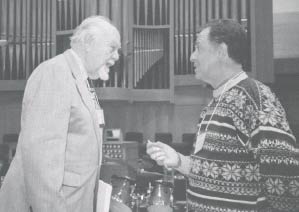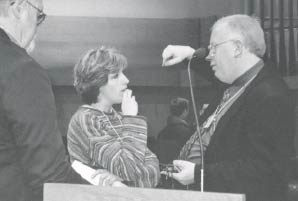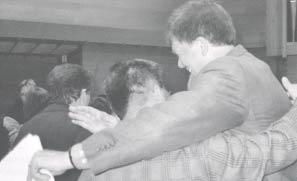Updated April, 2025
What’s the best way to present the doctrine of the atonement at a conference for worship planners and leaders? One way would be to suggest Scripture texts and songs that focus on this teaching of Scripture. But Donald Hustad, Carl Stam, and Paul Detterman—all from Louisville, Kentucky—collaborated in a more challenging approach: preparing and walking participants through a worship service celebrating Christ’s atoning work for the sins of the world. They led this teaching service at the Calvin Symposium on Worship and the Arts in January 2003. Parts of this resource are available on the website of the Calvin Institute of Christian Worship (www.calvin.edu/worship).
Perhaps your congregation would like to plan a Lenten service with the atonement of Christ as a theme. You’ll find many ideas to draw on for planning and leading such a service here.
The service elements presented are interspersed with commentary from the presenters.
—ERB
Ordering Worship in Response to Love
We have designed a particular style of Christian worship that is faithful to the Reformed tradition, is found in many ecumenical settings, and can be easily modified. We make no pretense of commending one style of music, worship, or prayer over any other style. We are more concerned with content than we are with style. (Sadly, in many places, this distinction is frequently reversed.) We’ve tried to mix styles through this presentation, all the while paying attention to the question “Why?” Why do we plan the worship we do, and how does our understanding of Jesus’ saving work inform our praise? As worship planners and leaders—or anyone whose fingerprints are on the order of worship—we are all sinners saved by grace. We must constantly ask ourselves, How do I translate the grace that I have known through the materials in the liturgy in a way that will make this grace unavoidable to people who are worshiping—both believers and seekers?
Let’s remind ourselves that if we have joy in our worship, it is because of Christ. If we have life, it is because of Christ. If we have a gospel, it is because of Christ.
Gathering Songs
“How Great Is Your Love” by Mark Altrogge (© 1990, Integrity’s Praise! Music/PDI Music)
“Only Your Mercy” by Scott Wesley Brown (© 1979, ThreeFold Amen Music)
“To God Be the Glory” Crosby
Gathering songs immediately engage people and help them know that they participate in worship—it’s not a spectator event. Singing immediately draws people in to the worshiping community, and the songs themselves can set the theology, the mood, the focus, and the ethos of worship—faster than either instrumental music or silence can.
The music does not have to address the topic or theme of the service at every turn. For example, the first gathering song is a simple statement of the reality of God’s love. The second affirms that God loved us first. The third does introduce the theme. As we plan worship and music, we must remember that the Christian gospel is good news, but it is also strange news to the ears of secular-minded believers as well as seekers.
If we are not careful with the opening part of the service, if we do not move into a time when we praise and glorify God, understand who God is, and, in light of that understanding, come to grips with who we are—we will have lost the congregation for the rest of the service.
Call to Worship
Once you were alienated from God and were enemies in your minds because of your evil behavior. But now he has reconciled you by Christ’s physical body through death to present you holy in his sight, without blemish and free from accusation—if you continue in your faith, established and firm, not moved from the hope held out in the gospel. (Col. 1:21-23) Through Jesus, therefore, let us continually offer up a sacrifice of praise—the fruit of lips that acknowledge God’s name. (Heb. 13:15)
Hymn: “All Hail the Power of Jesus’ Name” Perronet and Rippon
Take a look at the middle stanzas:
“O seed of Israel’s chosen race, now ransomed from the fall.” That’s us, and it includes me. We are so scared of individualism that we have forgotten that individuals need to know in their hearts that they are saved.
“Hail him who saves you by his grace, and crown him Lord of all.” The people coming through our doors have hundreds of little gods vying for the central altar of their lives. Our job is to help them put Jesus Christ at the center of their lives, where only he belongs.
“Let every tongue and every tribe responsive to the call, to him all majesty ascribe, and crown him Lord of all.” See how the progression of this hymn takes us from praise that includes me, to praise that includes all of creation, to praise that reminds us that our worship echoes the worship of heaven—all of creation and beyond!

Call to Confession
The proof of God’s amazing love is this: while we were sinners Christ died for us. Because we have faith in him, we dare to approach God with confidence. (Rom. 5:8; Heb. 4:16)
Confession
With confidence, with humility, let us confess our sins, first in silence, and then in song.
[An opportunity for prayer as the Holy Spirit prompts.]
“Kind and Merciful God” (see p. 23)
Watch the pacing in this sung prayer of confession. After a song of praise, we have to slow people down to give them an opportunity to pray. Stanza 4 asks God to “speak the words that forgive.” Those words come later, in the declaration of forgiveness.
Declaration of Forgiveness
Beloved in Christ, we have heard the gospel. And if we are faithful to confess, God will be faithful to forgive. If you hear nothing else today—nothing else in the prayers, nothing else in the songs, nothing else in the Word and the sermon—hear and receive these words: In Jesus Christ, in Jesus Christ, in Jesus Christ, you are forgiven. Your life is not your own. Give God the glory and praise.
Hymn of Response: “To God Be the Glory” Crouch (My Tribute)

Prayer for Illumination
Scripture Reading: Isaiah 53; Psalm 116; John 10:1-11
Reflection: What’s So Wondrous About the Cross?
Song of Assurance: “Before the Throne of God Above,” words by Charitie Bancroft, music by Vikki Cook (© 1993, PDI Worship)
Prayers of the People
Offering
Song: “I Stand in Awe” by Mark Altrogge (© 1987, PDI/Pleasant Hills Music)
Invitation to the Lord’s Table
Great Thanksgiving
The Lord be with you.
And also with you.
Lift up your hearts.
We lift them to the Lord.
Let us give thanks to the Lord our God.
It is right to give our thanks and praise.
[A prayer of thanksgiving for the creating work of God the Father.]
“Holy, Holy, Holy Is the Lord” by Nolene Price (© 1976, Nolene Price)
[A prayer of thanksgiving for the redeeming work of God the Son.]
“Christ Has Died, Christ Is Risen,” words by Fred Pratt Green, music by Jack Schrader (© 1980, Hope Publishing Co.)
[A prayer of thanksgiving for the sustaining work of God the Holy Spirit.]
Three sections in the Great Thanksgiving correspond to the three persons of God: Father, Son, and Holy Spirit. Each section of the prayer concludes with a congregational response—an affirmation of praise specifically intended to address the work of God that the prayer has recalled:
- Thanksgiving to God the Father, our Creator, concludes with the great hymn from Isaiah 6, “Holy, Holy, Holy Is the Lord!”
- Thanksgiving to God the Son, our Redeemer, prompts us to proclaim the whole Gospel in three short acclamations: “Christ has died! Christ is risen! Christ will come again!”
- Following thanksgiving to God the Holy Spirit, including a Spirit-inspired doxology, we pray our affirmation and agreement with a simple “Amen!”
- Traditionally, this prayer is followed by the words Jesus himself gave his disciples (which the Spirit also enables us to pray).
Music at Communion
“Come to the Water” by John Foley (© 1993, New Dawn/OCP)
“Hallelujah! We Sing Your Praises,” from South Africa (© 1984, Utryck, admin. by Walton)
“Now Behold the Lamb” SNC 144
“There Is a Redeemer” by Melody Green (© 1982, Birdwing Music/BMG Songs/Ears to Hear/EMI)

Responsive Reading: Psalm 103 (from Eugene Peterson’s The Message)
As in the planning of any set of songs or hymns, the logical progression of texts is significantly more important than the proximity of the musical key or the “flow” of the harmony and rhythm.
In the examples we suggest, the movement begins with the simple humility of believers “coming to the Lord” on what Don Hustad has called “level ground” around the cross. We then move to a South African joy cry with the verses recalling that the self-giving of Christ was not for a select few but for all who can be saved. The next piece serves as our Agnus Dei, recalling the proclamation of John the Baptist, “Behold, the Lamb of God!” and thanking God for that holy Lamb—because of whose grace we can live.
Finally, we are reminded that the same Spirit who makes sacrament reality also makes reality sacramental. God, who faithfully offers redemption, also is faithful to his promise of a Holy Presence—keeping us in his loving care until the appointed time of Christ’s return.
The prayer following communion is a simple reminder of thankfulness for all God has provided. Many within the Reformed tradition still use Psalm 103 as the basis for this acclamation.
Sending Hymn
“Name of All Majesty” (majestas), words by Timothy Dudley Smith, music by Michael Baughen; arr. Noël Tredinnick (© 1984, Hope Publishing Co.)
Charge
Benediction

